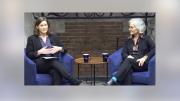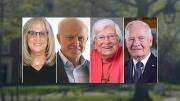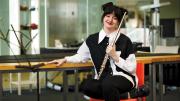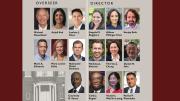During a discussion on campus Thursday evening, Marie Yovanovitch, the American ambassador to Ukraine from 2016 to 2019, advocated strongly for continued U.S. military assistance in the Ukrainian war effort and said that in retrospect, the United States and other Western countries could have done more to avert Russia’s invasion a year ago. “We should have been stronger in our response in the past” to Russian aggression, she said, beginning with the brutal Chechen war in 1999, which helped bring Vladimir Putin to power. “He killed thousands of people living in Chechnya….And to the best of my knowledge, the international community was quite silent on that,” Yovanovitch said. “It was considered to be sort of an internal issue.” Western reactions were similarly muted, she said, after Russia’s 2008 invasion of Georgia. In 2014, after Russia annexed the Crimean Peninsula from Ukraine, the international community imposed sanctions—but not until months later, when a Malaysian Airlines flight carrying more than 200 passengers, many of them Western Europeans, was shot down over Ukraine by Russian-controlled forces. The sanctions were painful, she said, “but not painful enough,” and “in retrospect, Russia was regrouping and rearming.”
The discussion with Yovanovitch was cosponsored by Harvard’s Ukrainian Research Institute (HURI) and the MIT Ukraine Program; the moderator was Emily Channell-Justice, director of the Temerty Contemporary Ukraine Program (part of HURI) and a sociocultural anthropologist who has conducted research in Ukraine since 2012. She asked about the anti-corruption and domestic reforms the country had undertaken during recent years, as well as about Yovanovitch’s time in the foreign service. Now a senior fellow at the Carnegie Endowment for International Peace, Yovanovitch previously served as ambassador in Armenia and the Kyrgyz Republic, and worked in U.S. embassies in Moscow, London, Ottawa, and Mogadishu.
But the conversation kept winding back to the current war. Yovanovitch expressed concern that American support for Ukraine might be softening, especially among some Republicans in Congress. The reasons for supporting Ukraine, she argued, are both a matter of values—“Ukraine is a young and struggling democracy that was invaded by a much larger country, a totalitarian state”—and a matter of self-interest. “This is definitely a war about Ukraine, where Putin wants to extend the Russian empire…but it’s also about destroying the international order,” she said. “If Putin prevails in Ukraine, he will keep going….And other dictators will be emboldened as well.” The world would become less safe, and “It makes commerce more difficult. It makes all of us more nervous, which makes us less free.” Referencing the $40-billion aid package Congress approved in 2022, she said, “That’s a fraction of the [Department of Defense] budget. And I think it is the deal of the century to be able to help Ukraine, stop Russia, and keep ourselves and our Western allies safe, with no U.S. boots on the ground.”
During the question-and-answer period, audience members asked about Russia’s growing relations with China, India, and South Africa; about former President Barack Obama’s hesitancy toward Russian aggression; and about the fallout from former President Donald Trump’s efforts in 2019 to pressure Ukrainian president Volodymyr Zelenskyy into announcing an investigation of the Bidens (for which Trump was later impeached). A visiting professor of international relations from Odessa University spoke of the “lingering trauma” and “lack of trust” that he believes still haunts relations between Ukraine and the United States. Yovanovitch acknowledged that there are “lingering scars,” and “not just with Ukraine.” Citing a brief exchange that made news in 2021, she said, “When President Biden went to his first G7 meeting in the U.K., he said, ‘We’re back.’ And one of his counterparts said, ‘For how long?’”
Other audience members asked Yovanovitch about the future for the Ukraine war and what lies ahead for the rest of the world. “If you look a year from now…where do you think we might be?” one asked.
“I think this war is going to go on for a while,” Yovanovitch answered—that’s partly why she advocated for an increase in military aid. “But even with that, I think it’s going to be a grinding war.” Ukrainians have no choice but to keep fighting it: “They saw after Bucha”—where Russian soldiers massacred hundreds of Ukrainian civilians during the first weeks of the war—“that this was a war of annihilation, that Russia wanted to kill Ukrainians, and, moreover, kill the Ukrainian culture and language.” And meanwhile, she added, “Russia, I think, is not ready to give up.”









